Iowa's Path To A Team Title
Iowa's Path To A Team Title
Iowa has an opportunity to get back on top of the NCAA heap. Check out the pathways and key factors for the Hawkeyes next week in Detroit.
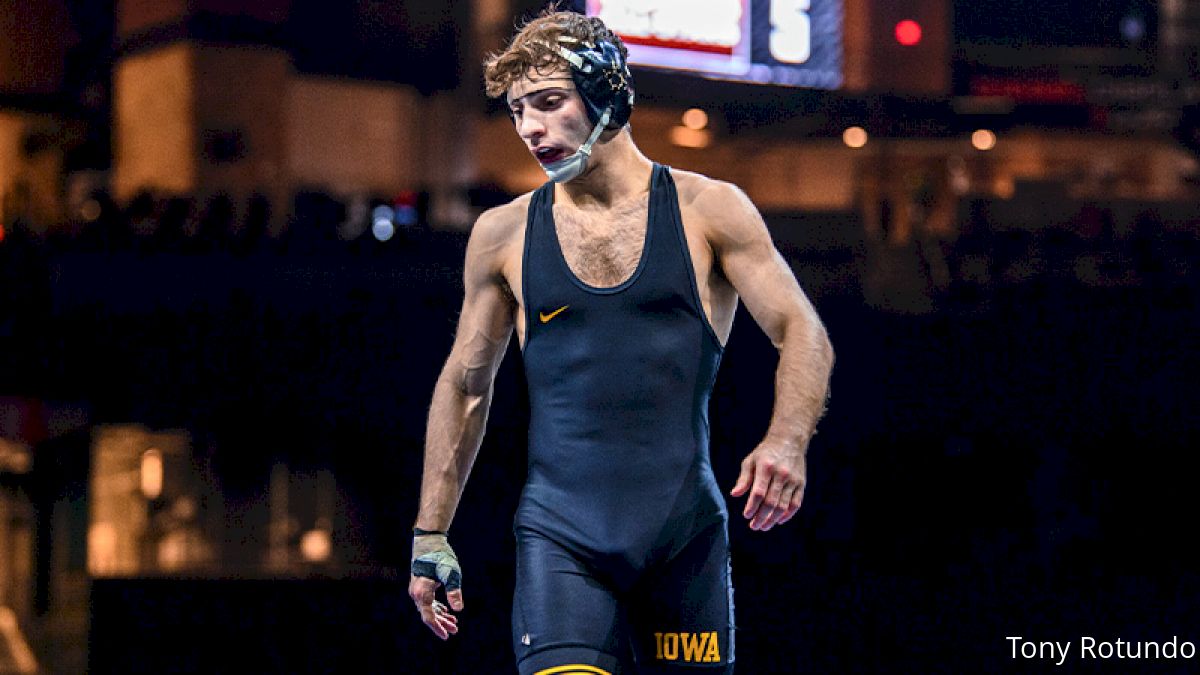
The NCAA restructured its tournament scoring system in 2001, placing a greater emphasis on team balance by increasing the point value of placing third through eighth at the national tournament.
Since then, teams that have captured the last 20 national titles have averaged a shade under 126 points at the NCAA Championships. Throw out the top two and bottom two point totals for title-winning teams during that stretch and the average comes at 126.4.
Since 2001, 10 NCAA championship teams have scored more than 126 points and 10 have come in under that mark, so let’s use 126 points as a benchmark for next week in Detroit.
What will it take for Iowa to get to 126 and put itself in contention for a second straight national title? Here's an in-depth look at the draws for the 10 Hawkeyes headed to Detroit and here are four more factors that will keep them on the path to the 126-point mark.
Good Health
Iowa’s title hopes hinge on health. Sure, the same can be said of other title contenders, but injuries have been a subplot throughout the season for the Hawkeyes, they prevented Iowa from getting the full band back together after last year’s championship run and they ultimately sank their Big Ten title hopes.
Three-time NCAA champ Spencer Lee, national finalist Michael Kemerer and 149-pounder Max Murin missed time early in the season. Lee went on the shelf in January to undergo a pair of ACL repairs just before Kemerer returned from a shoulder injury.
Iowa’s injury situation was one of the storylines coming out of the Big Ten Championships, where Kemerer medical forfeited to sixth after winning in the quarterfinals and freshman 125-pounder Drake Ayala, 141-pounder Jaydin Eierman and heavyweight Tony Cassioppi did not wrestle in the placement round.
Duplicating 2021
Iowa scored 129.5 points last year en route to the national title. Lee accounted for 24.5 during his march to the 125-pound title. While the Hawkeyes won’t have the two-time Hodge Trophy winner to bank on, it’s reasonable to think Ayala, Murin and Marinelli can combine to make up that difference and perhaps more. Murin won decisions in the first two rounds of last year’s tournament before dropping a pair of overtime bouts. Marinelli, the #1 seed a year ago at 165, notched a pair of major decisions in the first two rounds before getting knocked off by eventual champion Shane Griffith in the quarters. An injury prevented Marinelli from continuing in the tournament.
Combined, Lee, Murin and Marinelli scored 30.5 points, which seems like a number within reach for Ayala, Murin and Marinelli this time around.
Let’s look at the rest of the lineup.
Austin DeSanto took third last season and hasn’t lost to anyone besides the top two seeds at 133 — Roman Bravo-Young and Daton Fix — in the past two seasons. Jaydin Eierman, a finalist last year, is seeded second at 141. Kaleb Young placed seventh at 157 last year and enters Detroit as the #9 seed.
Kemerer was a finalist last season and he has his work cut out for him as the #5 seed in a star-studded top side of the 174-pound bracket. But he’s a gritty and savvy gamer with 10 career losses, nine of which have come against guys who appeared in the NCAA finals at one point.
The Hawkeyes picked up one team point last year from Nelson Brands at 184. They got a fourth-place finish at 197 from Jacob Warner, who comes into this year’s tournament seeded sixth. Cassioppi took third last year at heavyweight when he posted a pair of wins against Arizona State’s Cohlton Schultz, the only wrestler seeded ahead of him on the bottom side of the bracket.
Multiple Finalists
Iowa's run of representation in the NCAA finals is one of the most impressive streaks in college wrestling. The Hawkeyes have had a finalist every year since 1990 — Iowa coach Tom Brands’ sophomore season.
In the three decades since, the Hawkeyes have collected 13 NCAA team titles. Iowa had at least two finalists in 12 of those seasons. The exception was 2009 when the Hawkeyes captured the crown with 96.5 points — the fewest for a team champion with the current tournament scoring format.
Every championship team since has had at least two finalists and oftentimes three or more. Iowa has possibilities up and down its lineup.
DeSanto has firmly entrenched himself as the #3 guy on the 133-pound ladder during the past two seasons and he’ll likely need to get past reigning king Roman Bravo-Young in a potential semifinal. Though the Penn State star has won five straight in the series, the last four have been razor-thin margins.
Eierman and Kemerer wrestled on the big stage a year ago and have enough skill and craft to navigate challenging bracket paths.
Marinelli and Cassioppi helped themselves with their Big Ten tournament performances and captured #3 seeds.
A Confluence of Balance and Bonus
The Hawkeyes racked up a tournament-high 27 bonus points last year, which will be a tough figure to match in Detroit. For context, Cassioppi and Warner combined to score 29 total team points last year by placing third and fourth, respectively. So Iowa’s bonus count was essentially the equivalent of a couple of extra high-placing All-Americans.
Iowa’s starters last year scored bonus points in 43.8 percent of their matches last season. That number has dropped to 36.1 percent this year. The dip is mostly a reflection of taking Lee, one of college wrestling’s top bonus producers, out of the Hawkeye lineup.
Nonetheless, Iowa can’t count on another 27 bonus points in Detroit. So in order to get the magic number of 126 team points, the best bet for the Hawkeyes is to increase their All-American count this year.
Seven Hawkeyes reached the podium last March in St. Louis. Iowa will likely need at last seven — and maybe eight — All-Americans to get to 126 points.
DeSanto, Eierman, Murin, Marinelli, Kemerer, Warner and Cassioppi are each seeded eighth or better. Young, the #9 seed at 157, has reached the podium in two previous trips to the NCAA Championships. Ayala, the #13 seed at 125, has wins over the #9 and #10 seeds at the weight and went down to the wire with #6 seed Eric Barnett in the Big Ten quarterfinals.
Related Content
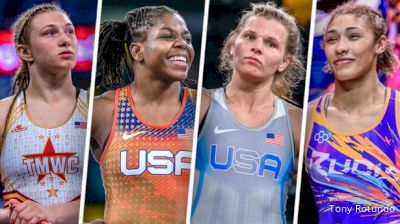 2024 Olympic Wrestling Trials Preview: Women's Freestyle 76 kg
2024 Olympic Wrestling Trials Preview: Women's Freestyle 76 kgApr 16, 2024
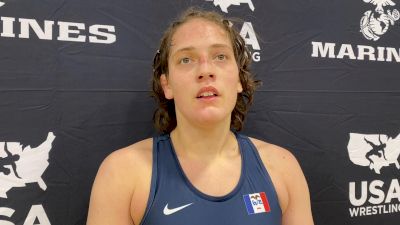 High Schooler Naomi Simon Makes U20 World Team
High Schooler Naomi Simon Makes U20 World TeamApr 14, 2024
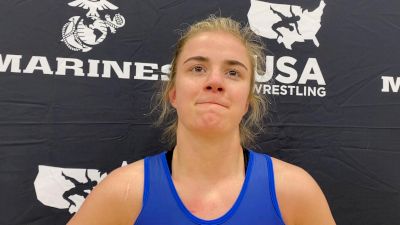 Reese Larramendy Faced Familiar Foe In U20 Finals
Reese Larramendy Faced Familiar Foe In U20 FinalsApr 14, 2024
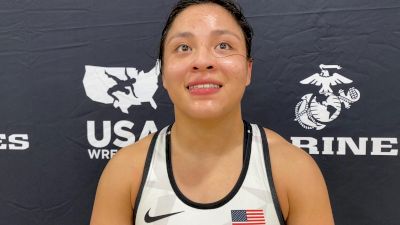 Brianna Gonzalez Brought Champion's Mentality To U20 World Team Trials
Brianna Gonzalez Brought Champion's Mentality To U20 World Team TrialsApr 14, 2024
 Dan Gable On Broken NCAA Point Record: 'What Took So Long?'
Dan Gable On Broken NCAA Point Record: 'What Took So Long?'Apr 9, 2024
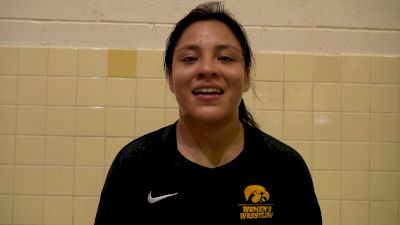 Brianna Gonzalez Expected To Win Last Chance Going In
Brianna Gonzalez Expected To Win Last Chance Going InApr 6, 2024
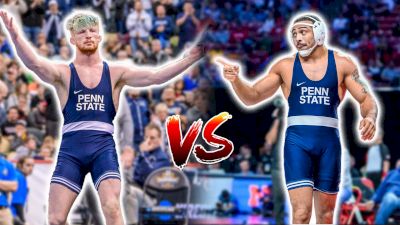 Bo Nickal vs Aaron Brooks - Who Wins?
Bo Nickal vs Aaron Brooks - Who Wins?Apr 10, 2024
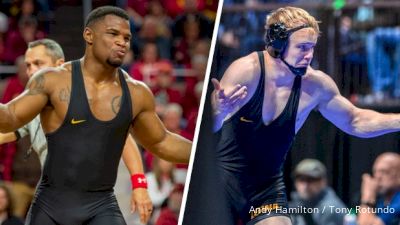 Iowa Wrestling Early Lineup Look - 2024-25 Season
Iowa Wrestling Early Lineup Look - 2024-25 SeasonApr 6, 2024
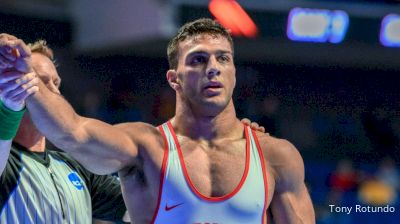 Michigan Adds Two-Time All-American 197-Pounder Jacob Cardenas
Michigan Adds Two-Time All-American 197-Pounder Jacob CardenasApr 5, 2024